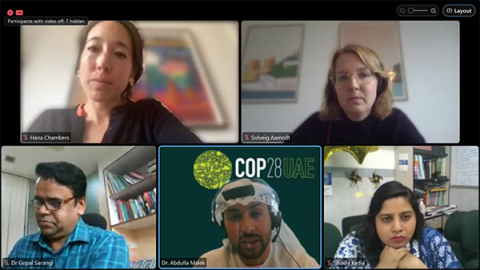TERI’s COP28 Compass Dialogue Reflected on Global South Perspectives on Climate Commitments

New Delhi, October 27, 2023: As a run up to the forthcoming COP28 climate negotiations to be held in Dubai, a Virtual Dialogue on COP28 Compass was organized by The Energy and Resources Institute (TERI) on Friday. The session brought together representatives from COP28 Presidency, United Nations Framework Convention on Climate Change (UNFCCC), International Energy Agency (IEA), and other subject matter experts. The speakers at the session underscored the need to raise commitments at sub-national, national, transboundary, and global levels to address climate change issues ahead of the upcoming COP28 scheduled from November 30 until December 12, 2023.
Incorporation of means for implementation and adaptation finance is key to success of Global Goal on Adaptation process at COP28.
Plurilateralism for inclusive climate transitions need to be sensitive to vulnerability of people and ecosystems.
The G20 New Delhi Leaders’ Declaration highlighted the need of USD 5.8-5.9 trillion in the pre-2030 period required for developing countries, for their needs to implement their NDCs, as well as the need of USD 4 trillion per year for clean energy technologies by 2030 to reach net zero emissions by 2050. Drawing from the outcomes of the G20 proceedings, COP28 Compass initiated dialogues with subject experts to deliberate on climate-related issues pertinent to the Global South.
Setting the tone for the dialogue, Dr Shailly Kedia of TERI, said, “The effectiveness of COP28 largely depends on the establishment of a strong framework for the global goal on adaptation. It will be a crucial factor in determining its success.” Discussing the G20 New Delhi's Leaders' Declaration, Dr Kedia pointed out, “Considering its significance in achieving equitable global outcomes, it is essential to address issues pertinent to the Global South.”
The first session, titled “Global Goal on Adaptation (GGA) and its Implications for Climate Justice,” was expertly moderated by Dr Manish Srivastava of TERI. The session featured distinguished speakers including Dr Olga Pilifosova (United Nations Framework Convention on Climate Change), Dr Saurabh Thakur (Maritime Expert), and Dr Archna Negi (Jawaharlal Nehru University). During the discussions, the spotlight was on the specific expectations related to the global goal on adaptation, particularly considering the widespread vulnerabilities present in the Global South. The discussion topic was exceptionally timely and of great significance, with the starting point being temperature goals. The discussions further delved into critical issues as COP28 is poised to play a pivotal role in shaping a concrete outcome regarding GGA. The GGA framework process established during COP26 is expected to find adoption at COP28, which will be pivotal to assess the progress made on adaptation for the global stocktake process. Dr Negi opened the session emphasizing the aim of GGA is not only to measure progress but to drive it in a manner that would strike a balance, which is practical yet ambitious, flexible, equitable and adaptive.
Dr Pilifosova pinpointed three key areas of contention in the GGA discussions. The first revolved around defining the goals, with varying views on whether they should involve specific targets, shared priorities, or political statements depending on their quantifiability. The second issue concerned the incorporation of means for implementation, with debates over whether to create financial goals separately or within another agenda item. The third pertained to differentiation and the Common but Differentiated Responsibilities and Respective Capabilities principle. Dr Pilifosova emphasized that due to the cross-border nature of the issue, unity and cooperation are essential.
The final speaker in the session, Dr Thakur, delivered a comprehensive address emphasizing the importance of giving greater attention to addressing maritime issues when it comes to climate adaptation and mitigation.
Moderating the second session on ‘Minilateralism and Energy Transitions’, Dr Gopal Sarangi, TERI School of Advanced Studies, underscored that the key takeaway was functional issues associated with JETPs considering both top-down and bottom-up approaches. Dr Abdulla Malek (COP28 Presidency), Ms Hana Chambers (International Energy Association) and Dr Solveig Aamodt (Centre for International Climate and Environmental Research), the speakers for the session highlighted the challenges and opportunities associated with Minilaterals such as Just Energy Transition Partnerships (JETPs) and its implications on the international climate finance regime. The role of ‘Minilaterals’ or ‘Climate Clubs’ and pledging financial support for climate action and energy transitions were critically discussed during the session.
Dr Malek said, “COP28 Presidency will work towards agile partnerships along with country leadership being the key to energy transitions. It is important to tackle systemic issues. Supply chains and ensuring critical minerals are important.” Ms Chambers emphasized the need to promote minilateralism and plurilateralism for inclusive and sustainable energy transitions, while guarding against JETP becoming global North-dominated; partner engagement is vital. Dr Solveig spoke on how JETPs can help in overcoming the inertia of larger multilateral processes like COPs. Further, she said that a holistic picture considering vulnerable groups and power relations should not be lost.
The session concluded on a note that COP Compass would direct its actions and initiatives that would seek to inspire and mobilize leadership at all levels, for inclusive transitions through ambitious and informed policies and measures which will enable paradigm shifts – towards meeting the UNFCCC and Paris goals through mitigation, adaptation and means of implementation.
The above event was organized under the banner of COP28 Compass, a component of TERI’s Act4Earth initiative, which was launched at the valedictory session of 21st edition of the World Sustainable Development Summit. The session was conducted in partnership with the Royal Norwegian Embassy, Bloomberg Philanthropies, Tata Cleantech Capital Limited and Johnson Controls.
To watch proceedings: https://youtu.be/gjFTnb2hje8
